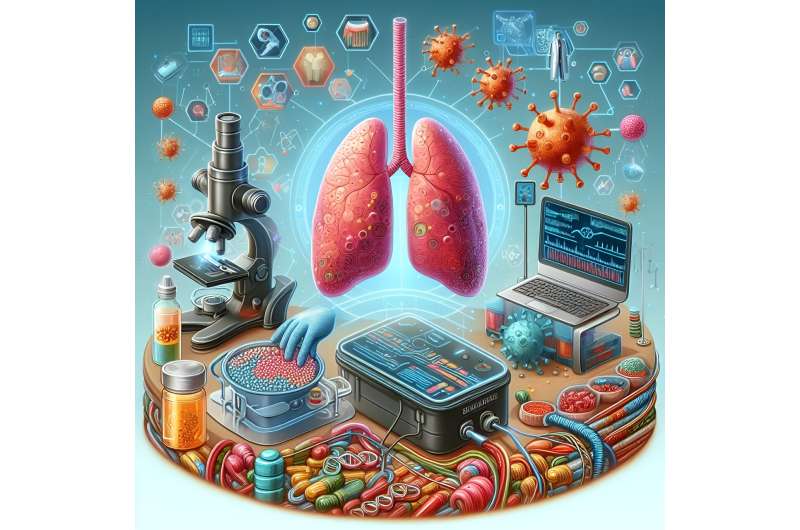This article has been reviewed according to Science X's editorial process and policies. Editors have highlighted the following attributes while ensuring the content's credibility:
fact-checked
trusted source
proofread
Multimodal AI model may guide personalized treatments for tuberculosis

A team of University of Michigan researchers has developed a multimodal AI model to predict treatment outcomes of tuberculosis (TB) patients. Their analysis of worldwide patient data may lead to personalization of TB treatment.
"TB is the world's deadliest infectious disease, affecting millions of people each year. The goal of my lab is to develop new innovative solutions to stop the spread of drug resistant pathogens like those that cause TB," said Sriram Chandrasekaran, corresponding author and associate professor of biomedical engineering.
In the study, appearing in iScience, the researchers analyzed multimodal data including diverse biomedical data from clinical tests, genomics, medical imaging and drug prescriptions from TB patients. By analyzing data from patients with varying levels of drug resistance, they discovered biomedical features predictive of treatment failure. They also uncovered drug regimens effective against specific sets of drug-resistant TB patients.
"Our multimodal AI model accurately predicted treatment prognosis and outperformed existing models that focus on a narrow set of clinical data," said Chandrasekaran.
"We identified drug regimens that were effective against certain types of drug-resistant TB across countries, which is very important due to the spread of drug-resistant TB," added Awanti Sambarey, first author and postdoctoral fellow.
Using AI, the team examined more than 5,000 patients. "This is real-world data we're talking about, so patients from different countries have different admission protocols," she said.
"We worked with more than 200 biomedical features in our analysis; we examined demographic information such as age and gender as well as prior treatment history. We also noted if the patients had other comorbidities, such as HIV, and then we worked with several imaging features such as their X-ray, CT scans, data from the pathogens, drug-resistance data, as well as genomic features and what mutations the pathogen had."
"It's really difficult clinically to look at the data all together," Sambarey said. "Typically, you would look at it separately. I think that's where AI comes in handy. When clinicians look at all of this data, it can be overwhelming. Here, our research is able to identify the most meaningful clinical features."
The team also studied the impact of the type of drug resistance present. "You can look at a specific snapshot of the data, such as genomic features and find what mutations the infecting pathogen had, and ask what some of the long-term treatment implications are," she added.
Surprisingly, they found that certain drug combinations worked better in patients with some types of resistance but not others, leading to treatment failure.
The researchers also found that drugs with antagonistic pharmaceutical interactions could result in worse outcomes. "Using AI to weed out antagonistic drugs early in the drug-discovery process can avoid treatment failure down the line," Chandrasekaran noted. "The AI model can also be eventually tailored to identify drug regimens suitable for individuals with certain comorbidities."
"Instead of a one-size-fits-all treatment approach, we hope that the study of multimodal data will help physicians treat patients with more personalized treatments to provide the best outcomes," said Sambarey.
More information: Awanti Sambarey et al, Integrative analysis of multimodal patient data identifies personalized predictors of tuberculosis treatment prognosis, iScience (2024). DOI: 10.1016/j.isci.2024.109025


















